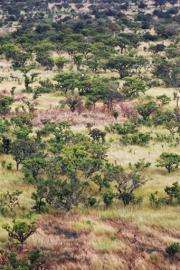Uganda forests rapidly disappearing: study

Uganda has lost nearly a third of its forest cover since 1990 due to expanding farmlands, a rapidly growing human population and increased urbanisation, a government report said on Friday.
In 1990, the east African nation had more than five million hectares of forest cover but by 2005 only 3.5 million hectares (8.6 million acres) remained, the report, published by Ugandan's National Environment Management Authority (NEMA), said.
If deforestation continues at the present rate Uganda will have lost all its forested land by 2050, it warned.
On average 10 percent of the population of Uganda has access to electricity, while the rest make do with firewood for cooking.
"Because 89 percent of rural Ugandans rely on burning firewood for cooking, deforestation is occurring at an alarming rate," NEMA said.
Compounding the problem is that Uganda, an east African country of roughly 31 million people, has one of the world's highest population growth rates.
Recent government estimates put the figure at more than seven live births per adult female.
This growth rate has resulted in the expansion of built-up areas in urban areas, particularly around the capital Kampala.
Three districts surrounding Kampala lost more than 78 percent of their forestland since 1990, as people have migrated out of the increasingly crowded city into neighbouring regions, according to the report.
(c) 2009 AFP
















